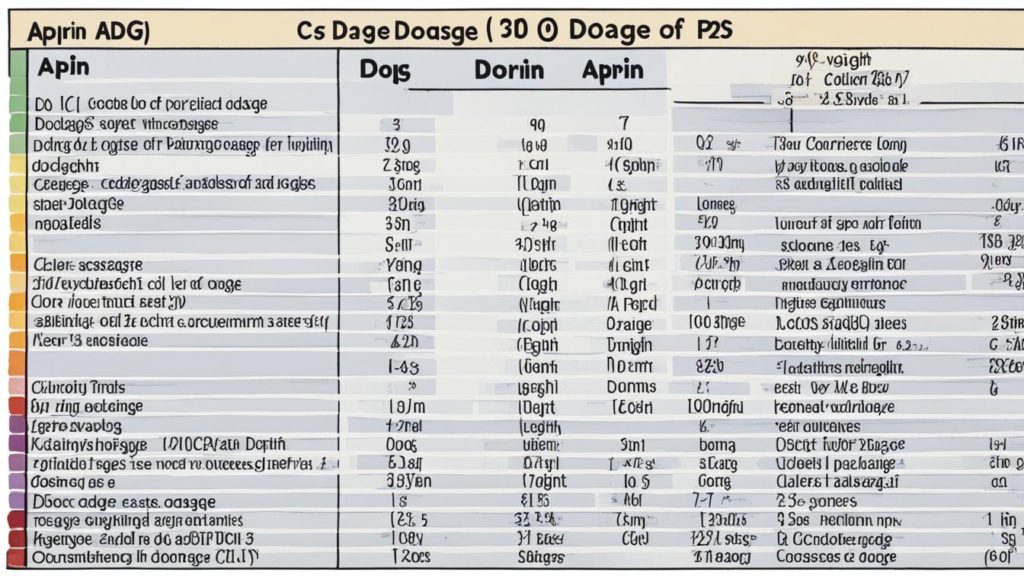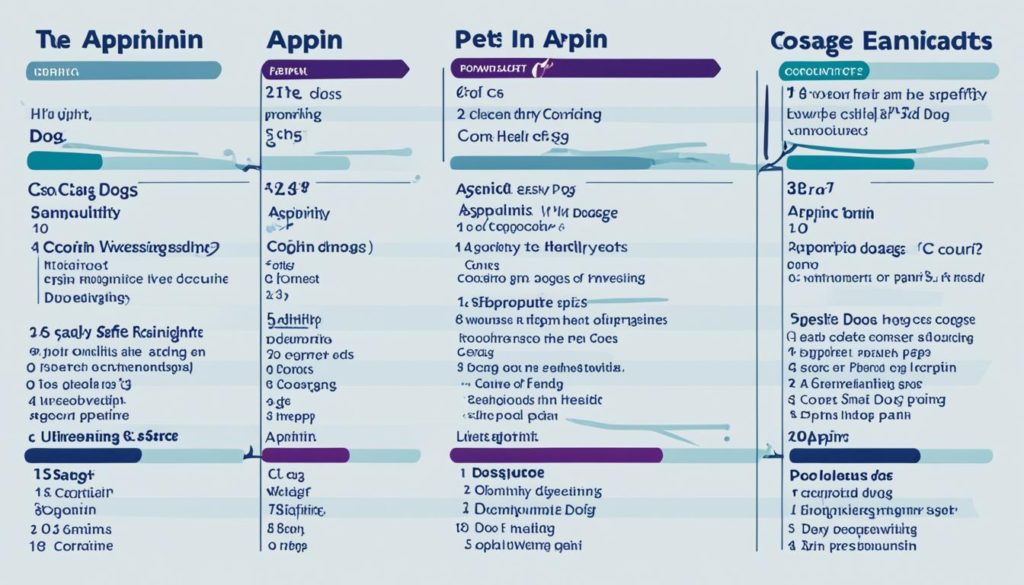As a pet owner, it’s essential to understand the correct dosage of aspirin for your dog to ensure their safety and well-being. While aspirin can be an effective non-steroidal anti-inflammatory drug (NSAID) for alleviating pain and inflammation in dogs, it’s crucial to follow proper dosage guidelines and consult with your veterinarian before administering any medication.
Key Takeaways:
- Consult with your veterinarian before giving your dog any medication, including aspirin.
- Human medications like ibuprofen and naproxen can be toxic to dogs.
- Some dogs may be allergic to aspirin, and certain medical conditions make it dangerous to administer aspirin.
- The dosage of aspirin for dogs varies based on their size and specific condition.
- Alternative pain relief options may be recommended by your vet.
Benefits and Risks of Aspirin for Dogs
Aspirin can provide temporary relief from pain and inflammation in dogs, making it a popular choice among pet owners. However, it’s essential to understand both the benefits and risks associated with aspirin use in dogs.
The Benefits of Aspirin for Dogs
- **Relief from Pain and Inflammation:** Aspirin is a non-steroidal anti-inflammatory drug (NSAID) that can help alleviate pain and reduce inflammation in dogs. It is commonly used to manage conditions such as arthritis, joint pain, and minor injuries.
- **Ease of Administration:** Aspirin is available in various forms, including tablets and chewable treats, making it convenient for dog owners to administer.
- **Cost-Effective:** Compared to some prescription medications, aspirin is generally more affordable, which can be a benefit for pet owners on a budget.
The Risks and Considerations
- **Allergies:** Just like humans, dogs can develop allergies to aspirin. It’s important to watch for signs such as itching, swelling, or difficulty breathing and discontinue use if an allergic reaction occurs.
- **Medical Conditions:** Dogs with specific medical conditions, such as asthma, ulcers, kidney issues, liver damage, bleeding disorders, or cancer, may be more susceptible to the risks associated with aspirin use. It’s crucial to consult with your veterinarian before administering aspirin to a dog with any pre-existing health conditions.
- **Toxicity:** Giving dogs excessive amounts of aspirin can lead to aspirin toxicity, which can be life-threatening. Symptoms of aspirin toxicity in dogs include lethargy, vomiting, diarrhea, loss of appetite, and difficulty walking. Long-term use of aspirin may also increase the risk of accidental toxicity.
If you’re considering aspirin as a part of your dog’s pain management plan, it’s essential to consult with your veterinarian. They will evaluate your dog’s specific needs, health condition, and advise you on the proper dosage and duration of use. Additionally, your vet may recommend alternative pain relief options or prescribe aspirin specifically formulated for dogs.
Administration and Dosage Guidelines for Dog Aspirin
Administering aspirin to dogs requires careful consideration of their size and specific condition. Dogs vary in size, and as a result, the dosage of aspirin differs. Smaller dogs typically require a smaller dose, while larger dogs may need a higher dose to achieve the desired effect. Consulting with a veterinarian is crucial to determine the correct dosage for your dog’s needs.
When determining the appropriate dosage, your vet will take several factors into account, including your dog’s weight and overall health. Based on these considerations, the vet may prescribe aspirin that is specifically formulated for dogs or recommend using human baby aspirin.
It’s important to note that human aspirin often has a coating that dogs cannot digest, which may impact its effectiveness. Therefore, it’s crucial to follow your vet’s instructions regarding the type of aspirin to administer to your dog.
Always adhere to your vet’s dosage instructions and be vigilant for any potential side effects. Monitoring your dog closely and reporting any changes or concerns to your vet is essential to ensure their well-being and safety.
| Weight Range | Aspirin Dosage |
|---|---|
| 10-30 lbs | ½ baby aspirin (81mg) |
| 30-50 lbs | 1 baby aspirin (81mg) |
| 50-99 lbs | 1 adult aspirin (325mg) |
| 100+ lbs | 1.5 adult aspirin (325mg) |

Alternatives to Aspirin for Dogs
While aspirin can be an effective pain reliever for dogs, there are alternative options that may be recommended by your vet. These alternatives can provide relief for your furry friend while minimizing the potential risks associated with aspirin.
1. Carprofen and Meloxicam
Carprofen and meloxicam are commonly prescribed medications for managing pain in dogs, particularly those with conditions like osteoarthritis. These medications belong to the class of nonsteroidal anti-inflammatory drugs (NSAIDs) and are specifically formulated for canine use. They work by reducing pain and inflammation, helping your dog feel more comfortable.
2. Natural Alternatives
If you prefer a more natural approach to pain relief, there are several options to consider:
- CBD oil for dogs: CBD, derived from hemp, has gained popularity for its potential pain-relieving properties. It can help reduce inflammation and alleviate discomfort in dogs.
- Glucosamine supplements: Glucosamine is a naturally occurring compound that promotes joint health and can be beneficial for dogs with arthritis or joint issues.
- Joint health-promoting foods: Certain foods, such as those containing omega-3 fatty acids and antioxidants, can support joint health and potentially reduce pain and inflammation in dogs.
It’s important to note that natural alternatives may not be appropriate for every dog or condition. Consult with your vet to determine if they are suitable for your furry friend.

Conclusion
Proper pain management for your dog is essential for their well-being and overall quality of life. When your furry friend is experiencing pain, it’s crucial to consult with a veterinarian who can provide expert guidance. Consulting a veterinarian for dog pain ensures that you are making informed decisions and utilizing safe medication options.
Pain relief for dogs can involve a combination of approaches. While medication, such as aspirin, may be prescribed, it’s important to follow the recommended dosage and guidance from your vet. Additionally, holistic approaches to dog pain relief, such as natural alternatives and lifestyle changes, can provide additional support. These may include the use of CBD oil, glucosamine supplements, or joint health-promoting foods.
Regular communication with your veterinarian is paramount in managing your dog’s pain. Your vet can help monitor your dog’s condition, assess the effectiveness of the chosen treatment plan, and make any necessary adjustments. By closely monitoring your dog’s behavior and response to treatment, you can ensure their comfort and safety.
Remember, the well-being of your furry friend is of utmost importance. By prioritizing their pain relief and seeking professional advice, you can provide them with the proper care they deserve. Your dog’s comfort and happiness should always be the primary focus in their pain management.
FAQ
What is the correct dosage of aspirin for dogs?
The correct dosage of aspirin for dogs varies based on their size and specific condition. It is crucial to consult with your vet to determine the appropriate dosage for your dog. They will take into account factors like your dog’s weight and overall health.
Are there any risks associated with giving aspirin to dogs?
Yes, there are risks associated with giving aspirin to dogs. Some dogs may be allergic to aspirin, and certain medical conditions like asthma, ulcers, kidney issues, liver damage, bleeding complications, and cancer can make it dangerous to administer aspirin. Giving dogs too much aspirin can lead to aspirin toxicity, which can cause symptoms like lethargy, vomiting, diarrhea, loss of appetite, and difficulty walking.
What are the alternative options to aspirin for managing a dog’s pain?
Carprofen and meloxicam are commonly prescribed medications for managing pain in dogs with conditions like osteoarthritis. Natural alternatives like CBD oil, glucosamine supplements, and joint health-promoting foods may also be worth considering. However, it’s important to consult with your vet before trying any alternative treatments to ensure they are safe and appropriate for your dog’s specific condition.
How should dog aspirin be administered, and how often?
The administration and dosage of dog aspirin should be determined by your vet. They may prescribe aspirin specifically formulated for dogs or instruct you to use human baby aspirin. Always follow your vet’s dosage instructions and be vigilant for any side effects.
What should I do if my dog experiences adverse reactions to aspirin?
If your dog experiences adverse reactions to aspirin, such as vomiting, diarrhea, or unusual behavior, stop administering the medication and consult your vet immediately. They will be able to advise you on the next steps to ensure your dog’s well-being.
Can long-term use of aspirin be harmful to dogs?
Yes, long-term use of aspirin can be harmful to dogs and may lead to accidental toxicity. It’s important to follow your vet’s instructions and only use aspirin as directed for the recommended duration. Regular communication with your vet and close monitoring of your dog’s condition and behavior are essential for ensuring their comfort and safety.
